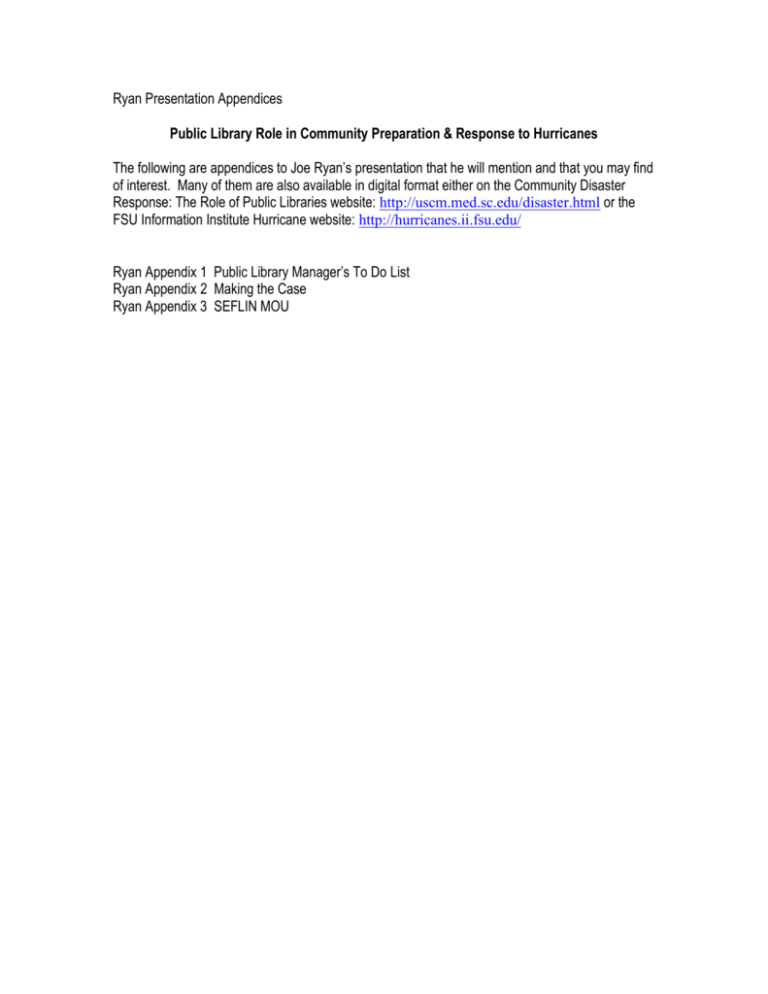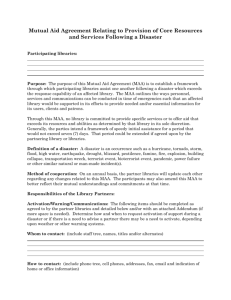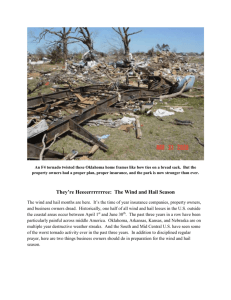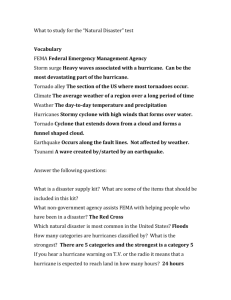
Ryan Presentation Appendices
Public Library Role in Community Preparation & Response to Hurricanes
The following are appendices to Joe Ryan’s presentation that he will mention and that you may find
of interest. Many of them are also available in digital format either on the Community Disaster
Response: The Role of Public Libraries website: http://uscm.med.sc.edu/disaster.html or the
FSU Information Institute Hurricane website: http://hurricanes.ii.fsu.edu/
Ryan Appendix 1 Public Library Manager’s To Do List
Ryan Appendix 2 Making the Case
Ryan Appendix 3 SEFLIN MOU
Ryan Appendix 1. Public Library Manager’s To Do List for this Hurricane Season
Joe Ryan <jzryan@earthlink.net>
This handout is intended for use in conjunction with the Hurricane Service Roles section of the Florida State
University’s Information Institute’s Hurricane Preparedness & Response for Florida’s Public Libraries web site
http://www.ii.fsu.edu/hurricanes/index.html The philosophy for the “To Do” list is better to start small and do something
than to do nothing. Below is a checklist, arranged by service role, of potential areas that may need attention at your
library. Pick no more than five (5) areas to work on this hurricane season. With five done, you will be that much better
prepared. You may also want to refer to best practices, resources, tools and tips under the appropriate role on the
public library – hurricane project web site.
Introduction -- Basic Steps
□ Assess your library’s capacity to perform each service role. What service role is or could be offered now with
minimal cost? What would it take and what would it cost to take additional steps?
□ Understand Emergency Management’s focus. Take online introductory NIMS training.
□ Meet with local government and Emergency Management. Use Make the Case. Determine community priorities for
public library disaster roles (Appendix A). Push for the public library as an “Essential service.”
□ Identify potential community and other library partners. Meet with them to pre-coordinate.
Provide a Safe Haven
□ Start a Disaster Plan, review an existing one, or improve one or two sections;
□ Check on library disaster supplies. Start a disaster cache “garbage can.”
□ Develop a Library Recovery Information Booklet.
□ Address staff training needs hold a staff briefing.
□ Become involved in local post disaster planning efforts. Imagine what you might do if you had to re-build a new
library in a new location.
Offer Normal Service
□ Develop a disaster service plan that considers heavy demand for certain services, new service ideas, in new
locations, with needed supplies cached, and with more flexible policies and procedures.
□ Identify relevant services the library already offers important to residents and evacuees from a hurricane.
□ Advertise these public library hurricane services to the community during hurricane season.
Be a Disaster Recovery Center (DRG)
□ Meet with Emergency Management and local government to determine the public library’s potential role. Is it a
FEMA DRC, a state, county or municipal DRC, a POD, or a Neighborhood DRC?
□ Review FEMA NIMS training IS-26 Guides to points of Distribution http://training.fema.gov/EMIWeb/IS/is26.asp
Become an Emergency Information Hub
□ Become an Emergency Communication Hub: What communication tool access does the library already offer? What
infrastructure changes might be needed to meet emergency demand? What supplies will be needed to meet
emergency demand? What funding may be needed?
□ Stay in touch with local hazard conditions. Buy a NOAA weather radio with AM and FM. Buy a TV.
□ Develop a Resident Hurricane Preparation Information booklet.
□ Develop an Evacuee and Resident Hurricane Recovery Information booklet.
□ Produce web versions of the two booklets.
□ Provide a /BackHome page on the library’s web site.
□ Develop web 2.0 preparation and recovery information applications.
□ Offer relevant e-government access
□ Offer resident (or responder) hurricane preparation training and videos in the library.
□ Establish a business disaster recovery center with community business partners
□ Secure the information infrastructure necessary to run these services.
Serve as a Community Cultural Resources Liaison
□ Review other efforts such as COSTEP for ideas.
□ Identify, inventory, prioritize and protect the library’s key cultural assets. Develop a form that communicates key
information to Emergency Management.
□ Meet with the community’s cultural organizations to coordinate hurricane response. Invite Emergency Management
and local government.
□ Task 1: Identify, inventory, prioritize and protect each cultural organizations cultural assets. Use a standardize form
developed with Emergency Management to assemble key information needed form each organization.
□ Task 2: Identify opportunities for mutual aid.
□ Task 3: Establish communication mechanism to monitor each others hurricane status and have a single point of
contact with Emergency Management during the crisis period.
Be an Evacuee Resource
□ Meet with local government and emergency management to pre-determine the public library’s role in aid of
hurricane evacuees.
□ Develop an Evacuee Hurricane Recovery Information booklet.
Improvise
□ Make provision for staff assignments with local government and emergency management. Try to secure public
library staff assignment to the public library.
□ Review and strengthen existing improvisation assets including staff, facilities, equipment, services and partnerships.
Share
□ Send a best practice to this web site to be shared with other public libraries. Contact
Joe Ryan jzryan@earthlink.net;
Ryan Appendix 2. Making the Case
The following is an extended argument drafted by Joe Ryan <jzryan@earthlink.net>, Project Manager,
Hurricane/Disaster Preparedness and Response by Utilizing Florida Public Libraries Project, Florida State University,
Information Institute <http://www.ii.fsu.edu/> for why public libraries should be viewed as an “essential service” in a
community’s response to hurricanes. Should you produce one of these for local use please e-mail a copy to Joe Ryan
so that he can improve this draft for others.
Making the Case for Public Libraries as Essential Disaster Services
Objective: To convince county emergency management, local government and key utility providers that public libraries
are “essential services” in disaster recovery. Local government, emergency management and key utilities agree to
quickly restore public libraries to service after a disaster so that the public library can do its part in the community’s
response to disaster.
Why matters: Locally public library managers will be able to get quick access to their facilities for damage
assessment, public libraries will be able to reopen sooner because debris will be cleared faster, minor repairs
accomplished quicker; electricity, telecommunications and other utilities will be restored sooner and library personnel
will be assigned on an emergency basis to libraries rather than scattered to other emergency tasks. Federal agency
(i.e. FEMA) “essential service” designation enables public libraries to be reimbursed for costs on par with other
responders.
The case: Public libraries have fulfilled a variety of roles essential to disaster recovery including:
Safe Haven: The public library is the community’s living room and study before and after a storm with safe,
secure buildings, relaxing space, light, air conditioning, bathrooms and comfortable chairs. Open public
libraries re-assert government presence in communities and provide hope.
Normal services: The community counts on normal library service before and after the storm, be it book
DVD or Internet use, reference or family programming. Normal service reduces stress, returns normalcy, and
offers recreation and distraction in a time of great need. Some libraries offer specific responder family
services allowing responders to do their job with less worry about their families.
Disaster Recovery Center (DRC) The public library offers community a DRC whether a FEMA designated
DR or not. The library becomes a place to prepare residents for a DRC visit. The library may serve as a
Point of distribution (POD) for hot meals, tarps, ice, sand and other essentials. The community uses the
library to meet and make sense of what just happened to them.
Information Hub The community counts on the library before and after a storm to offer access to copiers,
phones, fax computers, WiFi, Internet and hurricane preparation and recovery information and assistance.
Cultural Resource Coordinator: In some communities, the public library may serve as a liaison between
county emergency management (EM) and the community’s cultural institutions (CIs) from aquariums,
museums and zoos. A useful way to manage community assets in a crisis.
Evacuee Resource: Every year evacuees must leave their homes to escape hurricane threat. Sometimes
evacuees may come to our town in great numbers. The public library is one of a team of community
organizations that respond to evacuee need. Evacuees count on the nearest public library for a safe haven,
normal service, disaster recovery center, and emergency information hub.
Improvisation: The public library, its facilities and staff, are part of a team of disaster responders. The
community counts on the public library during a disaster to improvise and do whatever is needed as directed
by emergency management and local government.
For further discussion of public library hurricane roles see: http://www.ii.fsu.edu/hurricanes/. Since the aftermath of
Hurricane Andrew in 1992, Miami-Dade (FL) County government has agreed to restore three county services as soon
as possible after a hurricane: police, fire and public libraries. Local governments and Federal agencies could learn
from these experienced disaster responders and move public libraries to essential disaster service status.
Next Steps: The public library suggests that county emergency management, local government and key utility
providers meet to explore ways that the public library can better assist the community in its hurricane response.;
Ryan Appendix 3. SEFLIN Memorandum of Understanding
Memorandum of Understanding for Participating Libraries
Regional Disaster Planning and Support
This Memorandum of Understanding (MOU) is a mutual aid agreement and a totally voluntary
program between libraries in Southeast Florida. The program is facilitated by SEFLIN (Southeast
Florida Library Information Network).
I.
Purpose The purpose of the MOU is to establish a pre-arranged working relationship
between libraries in Southeast Florida that agree to share resources in the case of a disaster.
A.
This MOU is an agreement to assist participating libraries in one or more ways
during a disaster which exceeds the response capability of a library’s governing
authority.
B.
A disaster must impact upon a participating library’s ability to provide needed
and/or essential information and/or services for its users.
C.
The MOU outlines the ways, in time of emergencies, that personnel, services and
communications can be shared by participating libraries which are administered by
separate governing authorities.
D.
This MOU is an agreement to assist participating libraries in one or more ways
during a disaster which exceeds the response capability of a library’s governing
authority.
E.
The MOU outlines the ways, in time of emergencies, that personnel, services and
communications can be shared by participating libraries which are administered by
separate governing authorities.
II.
Participation
A.
It is agreed, acknowledged, and understood that participation in this
Memorandum of Understanding is purely voluntary and at the sole discretion of a
participating library. No participating library shall be liable in any manner to another
participating library.
III.
Modifications/Severance:
A.
This MOU provides flexibility for changing the parameters of mutual aid or the
ability to discontinue participation at any time.
B.
Any party to this MOU may withdraw at any time, upon a thirty day written
notice to each of the other participating libraries, and will no longer be a partner of the
MOU, but this MOU shall continue to exist among the remaining participants.
C.
None of the parties will incur any liability to the other by reason of termination.
D.
A participating library may refuse to provide or decide to withdraw personnel,
equipment, and other resources in order to provide for its own community.
E.
A participating library will make a good faith effort to notify the recipient
library 24 hours prior to resource withdrawal or, in the event that is not possible, in as
much time as is reasonable.
Definition of a Disaster:
F.
For the purposes of this MOU, a disaster is an occurrence such as a hurricane, tornado,
storm, flood, high water, wind-driven water, terrorist event, bioterrorist event, or other similar
natural or man-made incident(s) that creates human needs that require assistance and support of
participating libraries.
IV.
Purpose
A.
The purpose of the MOU is to establish a pre-arranged working relationship
between libraries in Southeast Florida that agree to share resources in the case of a
disaster.
B.
This MOU is an agreement to assist participating libraries in one or more ways
during a disaster which exceeds the response capability of a library’s governing
authority.
C.
A disaster must impact upon a participating library’s ability to provide needed
and/or essential information and/or services for its users.
D.
The MOU outlines the ways, in time of emergencies, that personnel, services and
communications can be shared by participating libraries which are administered by
separate governing authorities.
V.
Participation
A.
It is agreed, acknowledged, and understood that participation in this
Memorandum of Understanding is purely voluntary and at the sole discretion of a
participating library. No participating library shall be liable in any manner to another
participating library.
VI.
Modifications/Severance:
A.
This MOU provides flexibility for changing the parameters of mutual aid or the
ability to discontinue participation at any time.
B.
Any party to this MOU may withdraw at any time, upon a thirty day written
notice to each of the other participating libraries, and will no longer be a partner of the
MOU, but this MOU shall continue to exist among the remaining participants.
C.
None of the parties will incur any liability to the other by reason of termination.
D.
A participating library may refuse to provide or decide to withdraw personnel,
equipment, and other resources in order to provide for its own community.
E.
A participating library will make a good faith effort to notify the recipient
library 24 hours prior to resource withdrawal or, in the event that is not possible, in as
much time as is reasonable.
Definition of a Disaster:
F.
For the purposes of this MOU, a disaster is an occurrence such as a hurricane, tornado, storm,
flood, high water, wind-driven water, terrorist event, bioterrorist event, or other similar natural or man-made
incident(s) that creates human needs that require assistance and support of participating libraries.
VII.
Review of MOUs:
A.
On an annual basis, SEFLIN will facilitate a meeting of MOU participating
libraries to review MOU agreements and the resources available to participating
libraries in responding to a disaster.
VIII.
Responsibilities of the Participating Libraries:
A.
Ensure their information related to this Memorandum of Understanding is
current.
B.
Identify a single point of contact for information about the availability of
resources for participating libraries that may be seeking assistance.
C.
Participate in scheduled meetings to coordinate operational and
implementation issues to the maximum extent possible.
IX.
Activation:
A.
This MOU will be activated in the event of a declaration of a state of disaster by
the Governor of Florida, or the President of the United States.
B.
Other methods of activation may include a request from a participating library
based on a disaster that exceeds the response capability of the library’s governing
authority.
X.
Reporting a Disaster:
A.
Following a disaster, a participating library representative should attempt to
contact SEFLIN, or if SEFLIN can’t be contacted, a participating library, with the
following information.
1.
Name and contact information of person making the report
2.
Name(s) and address(es) of library/libraries affected by the
disaster
3.
Brief description of what has been affected by the disaster
damages to roof)
4.
Status of the facility(ies) being open or closed
5.
Specific assistance needed that can be provided by MOU
participating libraries
(e.g.,
6.
Name and contact information of the person(s) who is authorized to
arrange/accept assistance at the location of the disaster
B.
Methods for Communicating With SEFLIN:
Email – sloan@email.seflin.org, smithee@email.seflin.org, mayberry@email.seflin.org
1.
Telephone – SEFLIN Office: 877-733-5460 or 561-208-0984, Tom
Sloan: 561-317-8518 (cell) or 561-852-3431 (home), Jeannette Smithee: 954-
270-6162 (cell) or 954-480-8577
9910 (cell) or 561-745-3132 (home)
2.
C.
(home), Charles Mayberry: 954-232-
Disaster Reporting Form @ www.seflin.org
Method of Communicating With Participating Libraries:
1.
The names of contact persons and their contact information will be
available in the SEFLIN Regional Disaster Plan’s Contacts List.
XI.
Responding to a Disaster:
A.
SEFLIN’s Response:
1.
Collect reports from participating libraries and disseminate the
information to all interested parties (e.g., other libraries in the region, State
Library, SOLINET)
2.
Facilitate communications between participating libraries seeking
assistance and participating libraries offering assistance
3.
Post information on the Web at www.seflin.org
4.
Seek specific assistance from the larger library community as
identified by the library/libraries seeking assistance
B.
Participating Libraries Response:
1.
A participating library seeking assistance will contact the
representative(s) of other participating libraries regarding the specific
assistance needed. Requests may be verbal or in writing. If verbal, the request
shall be confirmed in writing no later than two (2) calendar days following the
verbal request.
2.
A participating library requested to provide assistance will, as quickly
as possible, respond to the representative of the library seeking assistance.
3.
All arrangements for providing assistance will be planned,
implemented, and monitored by representatives of a requesting and a
responding library.
4.
The duration of assistance provide by a participating library will be
determined by the nature of the disaster. Extensions on a daily or weekly
basis can be made if warranted and agreed upon by both the lender and the
receiver.
5.
Representatives of a requesting and responding library will keep
SEFLIN advised of the status of mutual aid activities.
XII.
Available Assistance:
A.
Assistance rendered may be in the form of personnel, equipment, materials and
services or supplies. Available assistance and resource will be listed in the SEFLIN
Regional Disaster Plan’s Resources List.
XIII.
Cost Recovery:
A.
Requesting and responding libraries are equally responsible for identifying,
documenting, and agreeing in writing to any and all costs that must be reimbursed.
B.
Participating libraries may wish to establish a tracking system for costs
incurred with date, cost, description of service and receipt or invoice and name of
requestor.
C.
SEFLIN assumes no financial responsibility for any costs associated with a
requesting and/or responding library.
XIV.
Indemnity:
A.
All participants shall indemnify and hold harmless all partners of this MOU,
their employees and agents, from any and all claims, actions and costs whatsoever that
may arise directly or indirectly out of any act or omission of its employees or agents, in
their performance of this Agreement. Such indemnification shall survive termination of
this Agreement.
XV.
Authorized Signatures
The undersigned are authorized to agree to this MOU on behalf of their Library. All rights reserved by each
library providing copies and/or records. No part of any resource may be reproduced in any form without the
prior written permission of the owner, except in instances where an archival or backup copy of an item is
placed on another network for the purposes of this MOU. The undersigned libraries are not responsible for
any errors, or any consequences caused as a result of the use, storage or services provided via this MOU.
This MOU is provided with the understanding that the libraries are not engaged in rendering any legal,
accounting or other professional services and shall not be held liable for any circumstances arising out of
this voluntary program or the MOU. If legal advice or other expert assistance is required, the services of a
competent professional should be sought.
Authorized Signature
Library Directors of Participating Library:
Print name:
Title:
Library:
Institution:
Address:
Date:
Disaster Contact
Staff Person of Participating Library
Print name:
Title:
Library:
Institution:
Address:
Date:







